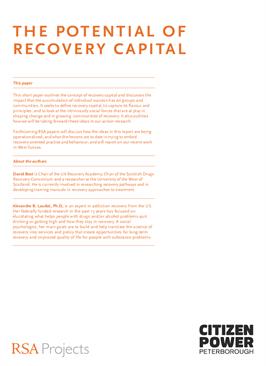Recovery from addiction comes about not through professional intervention and support alone, but also as a result of people’s ability to access key social, physical, human and cultural resources. The ‘recovery capital’ asserts that these combined forces create must be better understood in order to fully realise their potential to help people in recovery, their families and friends and the wider community.
The move in recent years towards ‘recovery-focused’ service provision within the addictions field is testament to an increasing awareness that people do recover from drug and alcohol dependence. However, the factors enabling recovery success are complex and still not fully understood – including the extent to which professional inputs play a part.
‘Recovery capital’ refers to the sum of resources necessary to initiate and sustain recovery from substance misuse. These include support from parents and family, partners, friends and neighbours but also key are the individual's engagement with, commitment to and participation in the community and its values.
It is becoming clear that recovery is grounded in the community and that it is a transition that can occur without professional input. Evidence also increasingly suggests that recovery is contagious, benefitting not only those people suffering from addiction but their families and communities, as well as impacting positively on other addicts.
By acknowledging that recovery takes place in the lived, physical community as well as among substance misusing groups, we can begin to develop stronger, more effective systems of recovery-oriented care. These systems should foster a greater sense of empowerment and improved life quality as a daily experience through contact with recovery ‘champions’ and better opportunities to engage in a range of community activities.
This paper helped shape our understanding of the advancing ‘Recovery Movement’ and informed the RSA Recovery Capital Project in Peterborough.
Are users the best place people to create and run their own recovery services? This seminar organised by Rebecca Daddow of RSA Projects explores the ideas of how new approaches to tackling substance misuse can unlock "recovery capital".
pdf 140.5 KB
Contributors



Be the first to write a comment
Comments
Please login to post a comment or reply
Don't have an account? Click here to register.